Urdu
Urdu (, ALA-LC: ) is an Indo-Aryan language spoken chiefly in South Asia. It is the national language and lingua franca of Pakistan, where it is also an official language alongside English. In India, Urdu is an Eighth Schedule language whose status and cultural heritage is recognized by the Constitution of India; it also has an official status in several Indian states. In Nepal, Urdu is a registered regional dialect.
The Urdu language has been described as a Persianised register of the Hindustani language; Urdu and Hindi share a common Sanskrit- and Prakrit-derived vocabulary base, phonology, syntax, and grammar, making them mutually intelligible during colloquial communication. While formal Urdu draws literary, political, and technical vocabulary from Persian, formal Hindi draws these aspects from Sanskrit; consequently, the two languages' mutual intelligibility effectively decreases as the factor of formality increases.
In 1837, Urdu became an official language of the British East India Company, replacing Persian across northern India during Company rule; Persian had until this point served as the court language of various Indo-Islamic empires. Religious, social, and political factors arose during the European colonial period that advocated a distinction between Urdu and Hindi, leading to the Hindi–Urdu controversy. Urdu became a literary language in the 18th century and two similar standard forms came into existence in Delhi and Lucknow. Since the partition of India in 1947, a third standard has arisen in the Pakistani city of Karachi. Deccani, an older form used in Deccan, became a court language of the Deccan sultanates by the 16th century.
According to 2022 estimates by Ethnologue, Urdu is the 10th-most widely spoken language in the world, with million total speakers, including those who speak it as a second language.
The name Urdu was first used by the poet Ghulam Hamadani Mushafi around 1780 for Hindustani language even though he himself also used Hindavi term in his poetry to define the language. Ordu means army in the Turkic languages. In late 18th century, it was known as Zaban-e-Urdu-e-Mualla means language of the exalted camp. Earlier it was known as Hindvi, Hindi and Hindustani.
The Urdu language has been described as a Persianised register of the Hindustani language; Urdu and Hindi share a common Sanskrit- and Prakrit-derived vocabulary base, phonology, syntax, and grammar, making them mutually intelligible during colloquial communication. While formal Urdu draws literary, political, and technical vocabulary from Persian, formal Hindi draws these aspects from Sanskrit; consequently, the two languages' mutual intelligibility effectively decreases as the factor of formality increases.
In 1837, Urdu became an official language of the British East India Company, replacing Persian across northern India during Company rule; Persian had until this point served as the court language of various Indo-Islamic empires. Religious, social, and political factors arose during the European colonial period that advocated a distinction between Urdu and Hindi, leading to the Hindi–Urdu controversy. Urdu became a literary language in the 18th century and two similar standard forms came into existence in Delhi and Lucknow. Since the partition of India in 1947, a third standard has arisen in the Pakistani city of Karachi. Deccani, an older form used in Deccan, became a court language of the Deccan sultanates by the 16th century.
According to 2022 estimates by Ethnologue, Urdu is the 10th-most widely spoken language in the world, with million total speakers, including those who speak it as a second language.
The name Urdu was first used by the poet Ghulam Hamadani Mushafi around 1780 for Hindustani language even though he himself also used Hindavi term in his poetry to define the language. Ordu means army in the Turkic languages. In late 18th century, it was known as Zaban-e-Urdu-e-Mualla means language of the exalted camp. Earlier it was known as Hindvi, Hindi and Hindustani.
Country
-
Bahrain
Bahrain (البحرين, locally ), officially the Kingdom of Bahrain, is an island country in Western Asia. It is situated on the Persian Gulf, and comprises a small archipelago made up of 50 natural islands and an additional 33 artificial islands, centered on Bahrain Island which makes up around 83 percent of the country's landmass. Bahrain is situated between Qatar and the northeastern coast of Saudi Arabia, to which it is connected by the King Fahd Causeway. According to the 2020 census, the country's population numbers 1,501,635, of whom 712,362 are Bahraini nationals. Bahrain spans some 760 km2, and is the third-smallest nation in Asia after the Maldives and Singapore. The capital and largest city is Manama.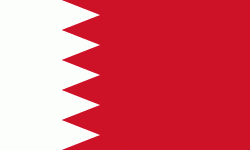
Bahrain is the site of the ancient Dilmun civilization. It has been famed since antiquity for its pearl fisheries, which were considered the best in the world into the 19th century. Bahrain was one of the earliest areas to be influenced by Islam, during the lifetime of Muhammad in 628 AD. Following a period of Arab rule, Bahrain was ruled by the Portuguese Empire from 1521 until 1602, when they were expelled by Shah Abbas I of the Safavid dynasty. In 1783, the Bani Utbah clan captured Bahrain from Nasr Al-Madhkur and it has since been ruled by the Al Khalifa royal family, with Ahmed al Fateh as Bahrain's first hakim. -
India
India, officially the Republic of India (Hindi: ), – "Official name: Republic of India."; – "Official name: Republic of India; Bharat Ganarajya (Hindi)"; – "Official name: Republic of India; Bharat."; – "Official name: English: Republic of India; Hindi:Bharat Ganarajya"; – "Official name: Republic of India"; – "Officially, Republic of India"; – "Official name: Republic of India"; – "India (Republic of India; Bharat Ganarajya)" is a country in South Asia. It is the seventh-largest country by area, the second-most populous country, and the most populous democracy in the world. Bounded by the Indian Ocean on the south, the Arabian Sea on the southwest, and the Bay of Bengal on the southeast, it shares land borders with Pakistan to the west; China, Nepal, and Bhutan to the north; and Bangladesh and Myanmar to the east. In the Indian Ocean, India is in the vicinity of Sri Lanka and the Maldives; its Andaman and Nicobar Islands share a maritime border with Thailand, Myanmar, and Indonesia.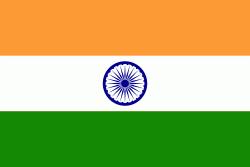
Modern humans arrived on the Indian subcontinent from Africa no later than 55,000 years ago. Their long occupation, initially in varying forms of isolation as hunter-gatherers, has made the region highly diverse, second only to Africa in human genetic diversity. Settled life emerged on the subcontinent in the western margins of the Indus river basin 9,000 years ago, evolving gradually into the Indus Valley Civilisation of the third millennium BCE. By, an archaic form of Sanskrit, an Indo-European language, had diffused into India from the northwest. (a) (b) (c), "In Punjab, a dry region with grasslands watered by five rivers (hence ‘panch’ and ‘ab’) draining the western Himalayas, one prehistoric culture left no material remains, but some of its ritual texts were preserved orally over the millennia. The culture is called Aryan, and evidence in its texts indicates that it spread slowly south-east, following the course of the Yamuna and Ganga Rivers. Its elite called itself Arya (pure) and distinguished themselves sharply from others. Aryans led kin groups organized as nomadic horse-herding tribes. Their ritual texts are called Vedas, composed in Sanskrit. Vedic Sanskrit is recorded only in hymns that were part of Vedic rituals to Aryan gods. To be Aryan apparently meant to belong to the elite among pastoral tribes. Texts that record Aryan culture are not precisely datable, but they seem to begin around 1200 BCE with four collections of Vedic hymns (Rg, Sama, Yajur, and Artharva)." -
Oman
Oman (عُمَان ' ), officially the Sultanate of Oman''' (سلْطنةُ عُمان ), is an Arab country located in Western Asia. It is situated on the southeastern coast of the Arabian Peninsula, and spans the mouth of the Persian Gulf. Oman shares land borders with Saudi Arabia, the United Arab Emirates, and Yemen, while sharing maritime borders with Iran and Pakistan. The coast is formed by the Arabian Sea on the southeast, and the Gulf of Oman on the northeast. The Madha and Musandam exclaves are surrounded by the United Arab Emirates on their land borders, with the Strait of Hormuz (which it shares with Iran) and the Gulf of Oman forming Musandam's coastal boundaries. Muscat is the nation's capital and largest city.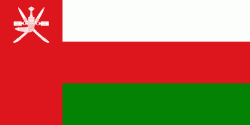
From the 17th century, the Omani Sultanate was an empire, vying with the Portuguese and British empires for influence in the Persian Gulf and Indian Ocean. At its peak in the 19th century, Omani influence and control extended across the Strait of Hormuz to Iran and Pakistan, and as far south as Zanzibar. When its power declined in the 20th century, the sultanate came under the influence of the United Kingdom. For over 300 years, the relations built between the two empires were based on mutual benefit. The UK recognized Oman's geographical importance as a trading hub that secured their trading lanes in the Persian Gulf and Indian Ocean and protected their empire in the Indian sub-continent. Historically, Muscat was the principal trading port of the Persian Gulf region. -
Pakistan
Pakistan, officially the Islamic Republic of Pakistan , is a country in South Asia. It is the world's fifth-most populous country, with a population of almost 243 million people, and has the world's second-largest Muslim population just behind Indonesia. Pakistan is the 33rd-largest country in the world by area and 2nd largest in South Asia, spanning 881,913 km2. It has a 1,046 km coastline along the Arabian Sea and Gulf of Oman in the south, and is bordered by India to the east, Afghanistan to the west, Iran to the southwest, and China to the northeast. It is separated narrowly from Tajikistan by Afghanistan's Wakhan Corridor in the north, and also shares a maritime border with Oman. Islamabad is the nation's capital, while Karachi is its largest city and financial centre.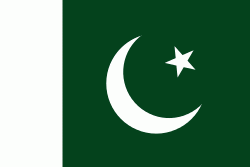
Pakistan is the site of several ancient cultures, including the 8,500-year-old Neolithic site of Mehrgarh in Balochistan, the Indus Valley civilisation of the Bronze Age, the most extensive of the civilisations of the Afro-Eurasia, and the ancient Gandhara civilization. The region that comprises the modern state of Pakistan was the realm of multiple empires and dynasties, including the Achaemenid; briefly that of Alexander the Great; the Seleucid, the Maurya, the Kushan, the Gupta; the Umayyad Caliphate in its southern regions, the Hindu Shahis, the Ghaznavids, the Delhi Sultanate, the Mughals, the Durranis, the Omani Empire, the Sikh Empire, British East India Company rule, and most recently, the British Indian Empire from 1858 to 1947. -
United Arab Emirates
The United Arab Emirates (UAE; اَلْإِمَارَات الْعَرَبِيَة الْمُتَحِدَة ), or simply the Emirates (الِْإمَارَات ), is a country in Western Asia (The Middle East). It is located at the eastern end of the Arabian Peninsula and shares borders with Oman and Saudi Arabia, while having maritime borders in the Persian Gulf with Qatar and Iran. Abu Dhabi is the nation's capital, while Dubai, the most populous city, is an international hub.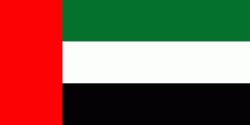
The United Arab Emirates is an elective monarchy formed from a federation of seven emirates, consisting of Abu Dhabi (the capital), Ajman, Dubai, Fujairah, Ras Al Khaimah, Sharjah and Umm Al Quwain. Each emirate is governed by an emir and together the emirs form the Federal Supreme Council. The members of the Federal Supreme Council elect a president and vice president from among their members. In practice, the emir of Abu Dhabi serves as president while the ruler of Dubai is vice president and also prime minister. In 2013, the country had a population of 9.2 million, of which 1.4 million were Emirati citizens and 7.8 million were expatriates. , the United Arab Emirates has an estimated population of roughly 9.9 million.
